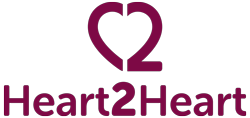If Your Child Needs a Pacemaker
Download this information sheet as a PDF
The aim of this information sheet is to provide you with information if your child needs a pacemaker.
The natural pacemaker
Everyone is born with their own natural pacemaker in their heart, called the sino-atrial (SA) node. The ‘SA node’ is made up of cells in the right atrium (upper right chamber) and sends out electrical impulses or signals across the upper chambers (atria) making them squeeze or contract.
The electrical signals then travel down to the lower chambers of the heart (ventricles) via the atrioventricular (AV) node, making the ventricles contract. It is this cycle of contraction of the atria followed by the ventricles which makes the heart beat and allows blood to be pumped around the body.
When your heart beats, it pumps blood to your lungs where it picks up oxygen, and then pumps this newly oxygenated blood around the body. The electrical signals make the heart work faster when the body needs more oxygen (for example during exercise), and more slowly when your body is at rest. This is why the cells in your heart which send out the signals are called the pacemaker.
What is an artificial pacemaker?
An artificial pacemaker is a small medical device that produces electrical impulses to help regulate the heartbeat. It’s a battery powered electronic circuit and has one or more electrode leads. An artificial pacemaker weighs 20 to 50 grams and is implanted under the skin or muscle in the chest or abdomen. Attached to the box are one or more electrode leads (pacing wires) which carry the electrical signals from the pacemaker to your child’s heart.
There are three main types of pacemaker:
- Pacemakers with one lead are called single chamber pacemakers
- Pacemakers with two leads are called dual chamber pacemakers
- Pacemakers with three leads are called biventricular pacemakers
The pacemaker is programmed to ensure that your child’s heart beats a certain number of times per minute. The pacemaker does this by measuring the length of time between each beat. If this is longer than it should be (meaning that your child’s heart is beating too slowly), an electrical impulse is sent from the battery to the heart. The electrical impulse makes the heart contract and produces a heartbeat.
Why would my child need an artificial pacemaker?
Sometimes a child is born with a defect in the heart which affects the electrical pathway. This causes an arrhythmia, the medical term for a fast, slow or irregular heartbeat. This may be because your child:
- was born with a defective SA or AV node (heart block)
- had an illness which damaged the SA or AV node
- developed an arrhythmia after heart surgery which caused the electrical pathway or natural pacemaker to be blocked or damaged
For how long will my child need a pacemaker?
At the moment most people who have a pacemaker fitted need it for the rest of their lives.
How long will the battery last?
Batteries are designed to work for a number of years. Replacing them involves a simple procedure called a box change. Your child will have regular checks to see that the pacemaker is working properly (called a pacing check). As a child gets bigger, the wires from the battery to the heart may need to be replaced with longer ones.
Is the pacemaker implant painful?
The pacemaker implant is performed under general anaesthetic. After your child recovers from the anaesthetic, they are likely to experience some soreness around the area where the pacemaker was inserted. Your child will be given painkillers to help with the pain. Once the scar from the implant is healed, your child should not feel any discomfort.
How do we know the pacemaker is working properly?
Your child’s pulse rate should not fall below the rate shown on his or her pacemaker card. If you are not sure how to take your child’s pulse, your cardiac nurse, GP’s practice nurse, health visitor and most other members of the medical profession will be able to show you.
Remember there are times when your child’s pulse rate may be higher than the minimum rate. The pacemaker is programmed to allow your child’s heart rate to increase naturally, for example during exercise. If necessary the pacemaker’s settings can be reprogrammed without the need for surgery during routine checks.
What restrictions will my child have?
Your child’s doctor will talk to you before you go home about when your child can return to their normal activities. The pacemaker should allow your child to be as active as other children if he or she is otherwise healthy.
Your child should avoid contact sports such as boxing or rugby which may cause damage to the pacing wires. Ask your doctor or cardiac nurse if there are any other restrictions to your child’s activities.
Will anything interfere with the pacemaker?
Ask the cardiologist for a pacemaker booklet. This will normally explain what types of appliances may interfere with the pacemaker function. Most everyday electrical items such as microwaves, drills and office equipment will not interfere with modern pacemakers.
However, some precautions include:
- Magnetic Resonance Imaging (MRI) scanning is not allowed (unless the pacemaker is an MRI safe pacemaker)
- Avoid airport security systems – your child should show his/her pacemaker card
- Mobile phones should not be placed over the pacemaker area
- Avoid placing magnets over the pacemaker area as this may alter the pre-programmed pacemaker settings
- Mention the pacemaker to a dentist or doctor who is likely to administer any treatment using electrical or magnetic equipment
Evidence and sources of information for this CHF information sheet can be obtained at:
(1) NHS Choices. Pacemaker implantation. London: NHS; 2017. Available at:
www.nhs.uk/conditions/PacemakerImplantation/Pages/Introduction.aspx
(2) Great Ormond Street factsheet – Living with a pace maker
About this document:
Published: June 2014
Reviewed: May 2022
To inform CHF of a comment or suggestion, please contact us via info@chfed.org.uk or Tel: 0300 561 0065.









